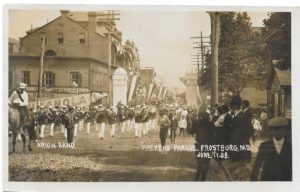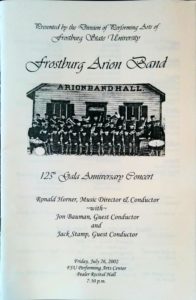 For longer than anyone has been alive today, Frostburg has always had the Arion Band. Before Alexander Graham Bell said, “Mr. Watson, come here I need you,” Watson could listen to the band playing a march or other popular piece of music.
For longer than anyone has been alive today, Frostburg has always had the Arion Band. Before Alexander Graham Bell said, “Mr. Watson, come here I need you,” Watson could listen to the band playing a march or other popular piece of music.
Through the Great Depression and victory at war, the Arion Band brought joy to Western Marylanders and celebrated with them whether it was a holiday or victory at war. Even as music styles changed, the Arion Band kept up with them and adapted.
“The Arion Band is believed to be the oldest, continually operating band in the country,” says Blair Knouse, president of the band. You might find bands that have been around longer, they have gaps in their history where most likely they weren’t performing for a time.
While the Arion Band’s membership fluctuates from season to season, it maintains about 30 active members who love making music, much like the founders of the band. Knouse has played flute with the band for five years.
Back in 1875, German coal miners in the Frostburg area formed a chorus that performed locally. The following year, the chorus purchased instruments so that the singers would have some accompaniment. Local furniture maker Conrad F. Nichol organized the musicians into the German Arion Band and became its first director.
“By 1877, they were saying, ‘This is fun. Let’s forget about singing,’” says band director Ron Horner, who has been in that position since 1995 and is only the seventh director that the band has had.
The band started practicing at the Gross and Nichol Furniture Store on February 5, 1879. This was where they continued to practice until the store burned down in 1888.
“The blaze claimed instruments, uniforms, music, and even the director as Mr. Nichol set about rebuilding his business,” Jay Stevens wrote in his history of the band, which was included in the program for the 125th-anniversary performance.
Band members and residents of communities in the area bought new instruments for the band and rehearsals continued in the Odd Fellows Hall in Frostburg.
In 1889, while under the direction of the second band director, John Miller, the band was sworn in at the 4th Battalion Band, a component of the Maryland State Militia. The band nearly went to war during the Spanish-American War.
“The entire band was drafted en masse as an army band, but then the war ended so they wound up not going into the war,” Knouse says.
As anti-German sentiment rose during World War I, the band, under the direction of its third director, George Vogtman, decided to drop “German” from its name.
During the Great Depression and much of World War II, R. Hilary Lancaster led the band. He was followed by Darrell Zeller, who led the band from 1943 until 1989. George McDowell led the band from 1989 until 1995.
Now in its 138th year, the Arion Band continues playing each summer season from mid-May through mid-September. During the season, they will play around 10 performances. They stay local playing at festivals, nursing home, and sporting events. Practices are held in the Arion Band Hall on Uhl Street, which was built in 1900.
“The furthest we’ve ever traveled since I’ve been a member is Altoona to play for at an Altoona Curves baseball game,” Knouse says.
However, the band did travel by train to Luray, Va., where it performed in the caverns, according to Stevens’ history.
The band gets its name from the ancient Corinthian, Arion He was a poet who was known for his musical invents, including the dithyramb. He is also remembered for the Greek myth of being kidnapped by pirates and thrown overboard, only to be rescued by dolphins.
All of the members are volunteers, who participate because they love playing music. They range from middle-school students to retired musicians.
“We have a lot of nice history and multiple generations playing,” Knouse says. This includes a father and daughter who play trumpets, in-laws, aunts, and cousins from local families.
There was time in its early years when musicians had to try out for the band. Once in the band, there was competition to play in the first seat for a particular instrument. This meant that musicians were serious about their practicing.
“If you were talking, they could hold your instrument for a week so that you couldn’t practice,” says Vice President Jeanette Tucker.
In modern times, the band has been open to anyone who has a desire to play music.
“We will work with whoever comes to play,” Tucker says. “The ones who don’t fit in kind of weed themselves out.”
She joined the band 19 years ago after she heard them performing at the Frostburg Soapbox Derby Day.
“I heard them play and I thought, ‘That’s what I want to be a part of,’” Tucker says.
Any money the band gets from its performances are used to pay the band’s expenses, such as travel and hall upkeep.
“We keep going because we have a sense of responsibility to keep the tradition alive and keep it going,” Horner says.
One way the band keeps that tradition alive is through their music choices. Horner’s job as director is to find the music that will appeal to the audiences that they play for. This has led to an evolving repertoire that remains top quality.
The musicians themselves are another reason for the longevity of the band. Once members join, they tend to remain with the band because it is fun and they form close relationships with the other members.
“We create something together that no one can do individually,” Horner says.
You might also enjoy these posts:
- Newspaper editor critical of county official killed after scathing article (part 1)
- Where was the casket that went with the handle?
- The Man Who Made Personalized Movies